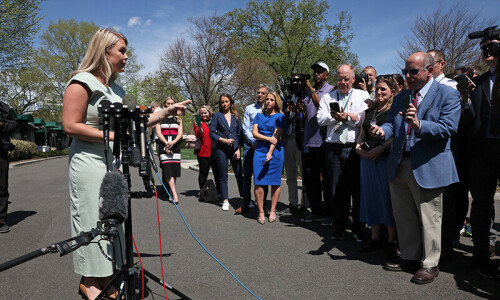• Stresses need to promote SMEs in farm storage and transportation
• Directs provision of reasonably priced inputs to farmers
ISLAMABAD: Prime Minister Shehbaz Sharif on Monday vowed to revitalise the country’s agriculture sector, achieve food self-sufficiency, and boost farm exports.
“In the next few years, an agricultural revolution can be brought to Pakistan if the federal government, in collaboration with provinces, provides reasonably priced inputs to farmers. The country needs a conducive environment to exploit the agri potential as we have fertile land, water resources, agricultural scientists and graduates, the prime minister said while inaugurating the Seed Potato Production and Aeroponics Complex at the National Agricultural Research Centre.
Mr Shehbaz regretted that the country is lagging in producing cotton and sugarcane, whereas our
neighbouring country has left us behind in the agriculture sector. We need to increase substantially the production of these two cash crops. He asked the minister for national food security and research to take serious and concrete measures to lift the agriculture sector.
Lauding the role of scientists in their research on agricultural development, he asked them to accept the challenge and take agriculture to its glory. If Pakistan has to progress, scientists have to play their role. “We have to nurture the agriculture sector to boost its contribution to the national economy,” Mr Shehbaz said.
The prime minister emphasised the need to develop and introduce small and medium enterprises (SMEs) in rural areas, saying that the country’s economy could have been high skies if infrastructure like storage and transportation could have been built in rural areas for value addition through SMEs.
“Our youth living in rural areas should not have to migrate to urban centres. Instead, they can engage in value-added businesses for the surplus production of fruits and vegetables. Agriculture is the backbone of our national economy as 65pc of the rural population is engaged in agriculture, and there is a need for investment by SMEs in rural areas,” the premier remarked.
Agri training
He said the government is sending 1,000 fresh graduates to China for training to help the farming community enhance agricultural productivity.
Mr Shehbaz Sharif said Pakistan, despite being an agricultural country, is spending $4.5 billion importing oilseeds, and we must take measures to reduce this expenditure.
The prime minister highlighted the importance of agricultural machinery in enhancing productivity and stressed that public-private partnerships would be encouraged to manufacture this machinery locally.
He thanked the Korean government for collaborating with Pakistan in the agricultural sector. He said the potato seed project will help ensure the availability of quality seed to growers, thereby increasing production.
Speaking on the occasion, the Administrator of the Rural Development Administration of South Korea, Kwon Jaehan, stated that Korea and Pakistan have already engaged in an exchange programme for agricultural genetic resources by sharing Pakistan’s wheat and Korea’s chilli pepper seeds.
We have also launched new livestock industry projects, including improvement of dairy cattle using high-quality Korean semen and selection of high-quality forage crop varieties to support Pakistan’s livestock sector development, he said.
KOPIA Pakistan Centre introduced aeroponic cultivation technology. As a result, seed potato productivity has dramatically increased six-fold compared to conventional methods. Following this, the Pakistan government committed to investing $2.5 million over five years, significantly expanding the scale of pilot cultivation.
By the end of the project in 2028, Pakistan is expected to produce up to 160,000 tonnes of seed potatoes each year, laying a solid foundation for self-sufficiency.
Nationwide distribution of high-quality, disease-free seed potatoes will further boost potato productivity, raise farmer income, and revitalise the rural economy, Kwon said.
Published in Dawn, March 25th, 2025













































